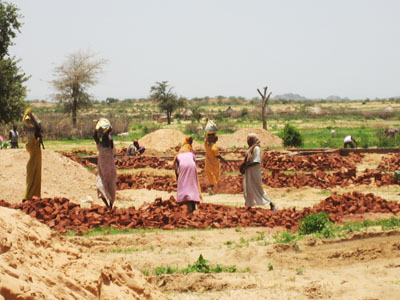
While the peace negotiations in Doha between Darfur’s various rebel groups and the Sudanese government initially offered some promise, the people of Darfur – and particularly the region’s estimated 2.7 million internally displaced people, or IDPs – will need far more substantive negotiations to take place before they are able to return to their homes in peace.
Issues of security, land occupation, and access to services continue to hamper the willingness of IDPs to return to their homes. Among the Darfuri IDP population, there are some who have opted to return to areas of continued insecurity in order to plant and harvest their crops, but most have chosen to remain in camps and with host communities that do not have the resources to support them for such an extended period of time. The humanitarian community, including the International Committee of the Red Cross, promotes the idea of “durable solutions” to displacement, or the “voluntary and dignified return, relocation or local integration of IDPs,” but solutions that are truly durable and dignified can be hard to find.
A solution being put forth by the Sudanese government is to construct “model villages.” The government’s Darfur Reconstruction and Development Fund initially proposed the concept as a way of providing housing and basic services to approximately 1.5 million people. According to the government proposal, the model villages would be constructed in the same locations as villages that had been burned down – largely by government-backed forces – during the conflict.
One such village is called Habila Kanare, which is currently being built with the help of the Arab League and opened despite the village’s shortcomings. Habila Kanare was designed to include 400 housing units, and will offer a hospital, education facilities, and pumps with clean water.
While the people of Darfur are accustomed to living small clusters of huts called tukuls, Habila Kanare and other model villages consist of large, brick housing compounds that hold one family in each unit. The goal behind building such villages is to encourage those who resettle in them to join in Darfur’s rapid urbanization, despite their semi-nomadic lifestyle prior to the conflict.
As a Voice of America report phrased it, these new villages are meant to “lure people out of the refugee camps.” But people familiar with Darfur’s unique displacement issues are concerned that the concept may raise more issues than it resolves. As Enough Policy Analyst Laura Jones points out, “[The Sudanese government] is likely building on land that doesn’t belong to it without the approval of the actual owners, who are probably living in displacement elsewhere.” The co-opting by the national government of land that typically belongs to Darfur’s displaced does not offer much hope in the way of longer-term sustainability.
Further, the model village concept does not address many of the security concerns that are preventing IDPs from returning. As VOA mentioned, the opening ceremony Habila Kanare highlighted some of the fundamental challenges of resettlement in Darfur:
“The uneasiness is palpable, with farmwomen, targeted by militias for rape and killing performing for the Arab League delegation, not far from their former tormentors.”
The insecurity felt by the residents of these areas, as well as the continuing pressure on, and competition for, land and renewable resources suggests that those who move to these areas are unlikely to stay. As projects such as Habila Kanare demonstrate, durable solutions for Darfur’s widespread displacement problem have to be identified in close partnership with the beneficiary communities and take into account their primary concerns.
“We are moving these IDPs from warehousing in the displaced camps to urban setting that will forever change their culture and way of living and destroy their social fabric,” said Enough Policy Advisor Omer Ismail. “Meanwhile, the land they left behind will be occupied by newcomers, further changing the demography of the region, fulfilling one of the goals of the genocidaires in Khartoum.”

